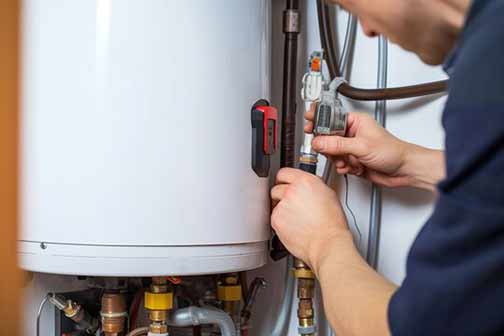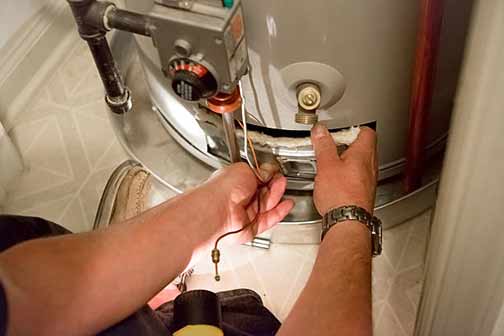
Electric water heaters are indispensable appliances in contemporary homes, delivering hot water for a myriad of needs, including bathing, cleaning, and cooking. The proper maintenance of these units is not merely a suggestion but a necessity to ensure their longevity and efficiency. Regular upkeep can prevent unexpected breakdowns and the high costs associated with repairs, making it a prudent investment for homeowners. By understanding the critical role of electric water heater maintenance, you can take proactive steps to keep your appliance in optimal condition, ensuring it serves your household reliably for years to come.
Essential Components of an Electric Water Heater: A Comprehensive Overview
To effectively maintain your electric water heater, it is essential to familiarize yourself with its key components. These typically include the tank, heating elements, thermostat, and pressure relief valve. The tank serves as the reservoir, storing the water until it’s needed. The heating elements are responsible for warming the water to the desired temperature. The thermostat plays a pivotal role in regulating the temperature, ensuring it remains consistent. Lastly, the pressure relief valve is a crucial safety feature that prevents excessive pressure buildup within the tank. By understanding these components, you can better identify potential issues and perform necessary maintenance tasks, thereby extending the life of your water heater.
Regular Inspection and Cleaning Procedures: A Step-by-Step Guide
Regular inspection and cleaning are vital for maintaining the efficiency of your electric water heater. Start by examining the tank for any signs of rust or leaks, as these can indicate underlying problems that need immediate attention. Next, inspect the heating elements for signs of corrosion, which can significantly affect their performance. Periodically flushing the tank to remove sediment buildup is also crucial, as sediment can reduce the heater’s efficiency and lifespan. By adhering to these procedures, you can ensure your water heater operates smoothly and efficiently, providing consistent hot water to meet your household needs.
Adjusting the Thermostat for Optimal Performance and Energy Savings
The thermostat is a critical component in regulating the temperature of your electric water heater. Setting it to the optimal temperature can enhance performance and prevent unnecessary energy waste. Typically, a temperature setting of 120 degrees Fahrenheit is recommended for most households. This temperature is sufficient for daily needs while minimizing the risk of scalding and excessive energy consumption. Regularly checking and adjusting the thermostat ensures your water heater operates efficiently and safely, contributing to both comfort and cost savings in your home.
Ensuring Safety with Pressure Relief Valve Maintenance: A Vital Practice
The pressure relief valve is a safety feature designed to release excess pressure from the tank, preventing potential hazards. Regular maintenance of this valve is crucial to ensure it functions correctly. Inspect the valve periodically to confirm it is not obstructed by debris and is capable of releasing pressure when necessary. If the valve is leaking or fails to release pressure, it may require replacement. Ensuring the pressure relief valve is in good condition is essential for the safe operation of your electric water heater, protecting both the appliance and your home.

Recognizing Signs of Wear and Potential Issues: Early Detection and Intervention
Being able to recognize signs of wear and potential issues with your electric water heater can help you address problems before they escalate. Common signs include inconsistent water temperature, unusual noises, and water discoloration. If you notice any of these symptoms, it’s important to investigate further and, if necessary, seek professional assistance. Early detection and intervention can prevent costly repairs and extend the lifespan of your water heater, ensuring it remains a reliable source of hot water for your household.
DIY Maintenance Tips for Homeowners: Simple Steps for Prolonged Efficiency
While some maintenance tasks may require professional assistance, there are several DIY tips homeowners can follow to keep their electric water heaters in top condition. Regularly flushing the tank to remove sediment buildup is a simple yet effective way to maintain efficiency. Checking the anode rod for corrosion and replacing it if necessary can prevent tank rusting. Additionally, insulating the tank and pipes can improve energy efficiency. By incorporating these DIY tips into your maintenance routine, you can ensure your water heater remains reliable and efficient, providing consistent hot water for your household needs.
The Benefits of Professional Servicing: Expert Care for Optimal Performance
Although DIY maintenance is beneficial, professional plumbers offers several advantages. Trained plumbers can perform comprehensive inspections, identify hidden issues, and provide expert water heater repairs and replacements. Professional servicing can also include advanced tasks such as replacing faulty components and optimizing the heater’s performance. Scheduling regular professional servicing ensures your electric water heater receives the attention it needs to operate at its best, providing peace of mind and maximizing the appliance’s lifespan.
Enhancing Energy Efficiency Through Maintenance: A Sustainable Approach
Maintaining your electric water heater not only extends its lifespan but also enhances energy efficiency. Regular cleaning and inspection prevent sediment buildup, which can cause the heater to work harder and consume more energy. Adjusting the thermostat and insulating the tank are additional measures that improve efficiency. By focusing on energy-efficient maintenance practices, homeowners can reduce utility bills and contribute to environmental sustainability, making responsible choices that benefit both their household and the planet.
Conclusion: Ensuring Longevity and Efficiency in Every Home Through Masterful Maintenance
Mastering electric water heater maintenance is essential for every homeowner seeking longevity and efficiency from their appliance. By understanding the importance of maintenance, familiarizing yourself with key components, and following regular inspection and cleaning procedures, you can ensure your water heater operates optimally. Adjusting the thermostat, maintaining the pressure relief valve, and recognizing signs of wear are crucial steps in this process. Whether through DIY efforts or professional servicing, consistent maintenance enhances energy efficiency and ensures the reliable performance of your electric water heater. Embrace these practices to enjoy the benefits of a well-maintained appliance in your home, ensuring comfort and convenience for your household.

